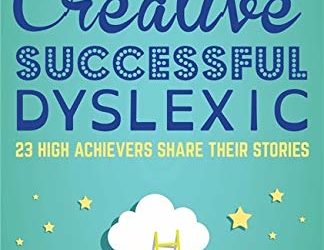Last week, Brock and I gave a presentation on the Strengths of Dyslexia at the Randall Library in Stow, Massachusetts via Zoom. Tina McAndrew, director of the Randall Library, got the idea to apply for a grant from the American Libraries Association after speaking to...
What’s the Point of the Dyslexic Mind? with Dr Brock Eide [Premium]
This webinar was rescheduled from a planned presentation at Cambridge University. Although dyslexia has traditionally been defined in negative and narrow terms, these definitions are poorly matched to the breadth of research on dyslexic children and adults. Here the Eides present their case that dyslexia should not be defined solely as a defect or deficiency, but rather as a cognitive specialization – that prioritizes episodic cognition.
Chat with Tristan Morris: Audiobook Narrator for The Dyslexic Advantage
Our updated 2023 version of The Dyslexic Advantage is available in audiobook from places like Amazon / Audible, and Brock and I enjoyed hearing Tristan's narration, so we reached out to him for this interview. Brock listens to books at a high speed of playback and he...
Dyslexic Advantage Travels to England
In a whirlwind trip, Brock met up with Dr. Helen Taylor of the University of Strathclyde and Cambridge University (Dyslexia as an Evolutionary Advantage) to speak at GCHQ (Government Communications Headquarters) - the United Kingdom's Code and Cypher School, Imperial...
Revised and Updated The Dyslexic Advantage: Q & A with Dr. Brock Eide
* MIND is an acronym from the first edition of Dyslexic Advantage. It stands for Material Reasoning, Interconnected Reasoning, Narrative Reasoning, and Dynamic Reasoning. Q: It's been 11 years since the first edition of The Dyslexic Advantage was published. Why is it...
Dyslexic Advantages in Electrical Engineering [Premium]
A TALE OF TWO STORIES “At the beginning I can remember looking at blackboards or pages of text having no idea what other kids around me were seeing. For me the pages may have well as been blank for all I could glean from them. However I was lucky as when I started my secondary school my teacher spotted that I was having problems. I was tested for dyslexia and found to have a mild form… By the time I left I had poor grades and was told I would not amount to much…” Same person: “I became interested in geeky stuff when I was less than ten years old. I remember being given a toy wind up clock that you could open the back […]
Building Spatial Talents [Premium]
“…Spatial reasoning has been key to numerous scientific advances, such as the discovery of the double-helix structure of DNA and the epidemiological research using maps to discover the true source of cholera outbreaks. It is also essential to many 21st-century careers, particularly in science and engineering… But are we able to see and support these particular kinds of talent in our classrooms?” — Lakin and Wai, Phi Delta Kappan What are spatial talents? In short, they are talents that involve visualizing objects and places in 3d and being able to manipulate them at will. These are talents that seem rich within the dyslexic community, but may be overlooked or neglected in conventional school activities. It’s an important strength set to recognize because it tends […]
Creative, Successful, Dyslexic and Dyslexia Is My Superpower Author Margaret Rooke
Margaret Rooke is the British author of Creative Successful Dyslexic and Dyslexia is My Superpower. Her books can be purchased online HERE or HERE. Margaret also wrote us , and shared the following from her personal journey with dyslexia: "All parents are...
Emotional Resilience [Premium]
A Short Video on Building Personal Resilience The second video is a good cartoon introduction to the idea of Emotional Intelligence. It has some good examples and insights, but occasionally has some misses. Try it out first yourself and see if it might be helpful sharing with a student.
Dyslexia and Stronger Emotional Responses [Premium]
Neuroscientists at the University of California San Francisco, just reported their finding that dyslexic children ages 7-12 showed stronger emotional responses as measured by a variety of measures than their non-dyslexic peers. From the study abstract: “..we examined whether right-hemisphere-based emotional reactivity may be elevated in dyslexia. We measured emotional reactivity (i.e., facial behavior, physiological activity, and subjective experience) in 54 children ages 7–12 with (n = 32) and without (n = 22) dyslexia while they viewed emotion-inducing film clips. Participants also underwent task-free functional magnetic resonance imaging. Parents of children with dyslexia completed the Behavior Assessment System for Children, which assesses real-world behavior. During film viewing, children with dyslexia exhibited significantly greater reactivity in emotional facial behavior, skin conductance level, and respiration rate […]
Tips From Hannah: College Junior with a 4.0 [Premium]
KNOW YOUR STRENGTHS – SELF-ADVOCATE – Early in group work, let your fellow students know that you’re dyslexic. Say, “I’m dyslexic, so I can’t read or write well, but I’m creative and can come up with ideas.” – Don’t be afraid of asking students to read things for you. You can help more if people read things aloud to you. – Research on RateMyProfessor ahead of time to find teachers that will work with you re: dyslexia. Are there any warning signs? I like choosing professors who like a lot of class participation. ASK FOR SUBSITUTIONS IF YOU NEED THEM When snow days upset the schedule at school, Hannah had to face learning material and putting together an assignment over Thanksgiving break without the help […]
Dyslexic MIND Strengths… for Kids!
Q: What can you tell me about MIND strengths and dyslexia? A: MIND-Strengths was a concept that we developed in our 2011 book, The Dyslexic Advantage. Both the book and the concept had their origin in our observations that dyslexic people not only shared certain kinds...


![What’s the Point of the Dyslexic Mind? with Dr Brock Eide [Premium]](https://www.dyslexicadvantage.org/wp-content/uploads/2023/05/Screen-Shot-2023-05-21-at-7.50.20-AM-400x250.png)



![Dyslexic Advantages in Electrical Engineering [Premium]](https://www.dyslexicadvantage.org/wp-content/uploads/2022/12/Dyslexic-Advantages-in-Electrical-Engineering-Premium.jpg)
![Building Spatial Talents [Premium]](https://www.dyslexicadvantage.org/wp-content/uploads/2022/10/Building-Spatial-Talents.png)

![Emotional Resilience [Premium]](https://www.dyslexicadvantage.org/wp-content/uploads/2021/04/Tips-to-Build-Resilience-320x250.png)
![Dyslexia and Stronger Emotional Responses [Premium]](https://www.dyslexicadvantage.org/wp-content/uploads/2021/04/Stronger-Emotional-292x250.png)
![Tips From Hannah: College Junior with a 4.0 [Premium]](https://www.dyslexicadvantage.org/wp-content/uploads/2021/04/Hannah-306x250.png)














